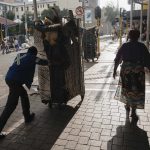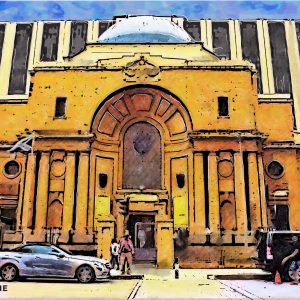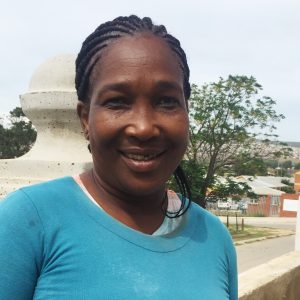A woman street seller in Durban stands up to authorities
Verushka Memdutt, who has been a trader for almost three decades, fights bureaucratic bylaws and unfair policing all the while supporting her family and community.
Author:
31 March 2020

Verushka Memdutt is one of a handful of activists championing the cause of South Africa’s street traders, who make up the country’s 2.5 million-strong informal sector.
The pint-sized powerhouse started out her working life as a street seller on Queen Street in Durban, flogging potatoes while studying by correspondence in her teens. At night her mother helped her count up her day’s takings in piles of grubby coins. In the 26 years since, Memdutt has become a wife and mother of two – and a troublemaker of note.
She is a vociferous critic of the eThekwini Municipality and a tireless campaigner for the rights of street sellers, who experts estimate contribute between 5% and 8% of South Africa’s gross domestic product.
Memdutt is the general secretary of the Market Users Committee (MUC), a body that represents 3 600 traders. She is pitted against a host of powerful officials, and her activism has seen her chucked out of meetings and hauled into court.
The risks in street trading
“I’m vocal,” Memdutt yells amid the hubbub of the market. The backdrop is a whirr of reversing forklifts, loading and unloading of trucks, wiry men hauling sacks of potatoes, onions and cabbages, boxes of bananas and more. It’s a heady space with whistling and jostling, a place to constantly mind your step. The Clairwood market where Memdutt works is representative of hundreds around the country where impoverished but canny traders make a living. They have to watch every cent and haggle for the best price.
Memdutt says traders are often typecast as lowly, rough and disrespectful. But every day they survive their pressured environment, operating on risk and laying out cash, often for perishable produce that must be moved quickly.
“What the traders make today decides what their families eat tonight. Tomorrow is not for granted. Their effort makes their reward,” Memdutt says.
The business is subject to a host of unpredictables, like weather, transport stoppages or the attitude of municipal officials, which is often arbitrary, corrupt or unfair. Traders are easy game for municipalities across the country that are being harried by big companies to “clean up” and crack down unregulated businesses.
Related article:
The MUC monitors eThekwini’s allocation of trading sites and its policing of traders. Brian Phalloh, the general secretary of the South African Informal Traders Forum, says traders are regarded as “third-class citizens” by municipalities across the country.
“They don’t want to create a space for this sector to engage. They have no policy to inform bylaws. We don’t need police. The traders are not thieves.”
Phalloh says the government describes the sector as fragmented, but it is organised with block committees that police cleanliness and broken ablutions. Traders host workshops and share information while the government talks of “clean sweeps”.
Traders have also successfully overturned decisions hostile to traders in court. Officials fine traders without permits, which are often difficult to get, and sometimes confiscate their goods, in spite of a 2014 Durban High Court ruling that it is unlawful.
Phalloh says government is “trying to get rid” of them. “They fill our lives with red tape. A mama who sells vetkoek is up before dawn, and she sells and goes home by 8am. What regulation is required for that?”
Related article:
Memdutt constantly butts heads with officials in her quest for transparency. “Individuals use their positions to favour certain people. The City is happy to engage, but the question is who they are engaging with.”
Memdutt recently triumphed after a year-long battle where she questioned the legitimacy of an organisation claiming to represent traders. “Big guys in big cars arrived with lots of documents.”
It was the sheriff of the court, delivering an interdict.
Memdutt was accused of harassment but, with the help of other activists, won a court victory that overturned the organisation’s elections.
Inner-city economies
eThekwini’s response to street selling hasn’t seen the city covered in glory. According to non-governmental agency AeT or Asiye eTafuleni (which means “bring it to the table” in isiZulu), street sellers are among the country’s most impoverished and most vulnerable.
AeT’s Richard Dobson has described the “widening gap” between eThekwini’s urban agenda and the realities faced by inner-city street sellers. “From being a city that had an exemplary approach to informality, it has retreated into defensiveness and conservativism. This is evidenced in the lack of investment in infrastructure. There is also a tendency towards reactive management, evidenced by additional bylaws and police enforcement.”
Juliet Hlongwa has been a trader at Warwick Junction in eThekwini for 26 years. “I wish the municipality would come and see how hard it is to be a street trader without shelter. I pay monthly fees to the municipality, but I have no shelter. When it rains, I am always thinking about my stock.
“This is my only source of income. If I make a loss, my kids at home will suffer. I won’t be able to put food on the table,” says Hlongwa.
Dobson says traders are trying to get a toehold in the inner-city economy. In Durban, 6 000 to 8 000 traders work the Warwick Junction area, a transport nexus for nearly 500 000 daily commuters. Street selling is rooted in the community, directly servicing impoverished people and is a low-barrier job amid growing unemployment.
Related article:
A 2018 study by the University of the Western Cape found that street selling played a critical role in food security, facilitating access to food by the urban impoverished. Traders sell everything from mielies to coat hangers and secret socks.
Memdutt says a fruit trader with a site in town typically buys three boxes, maybe bananas, apples and oranges, spending about R1 000 every two days. A trader without a site, walking around with a fruit box, spends about R300. If business is brisk, each can double their money.
Memdutt understands the city has to regulate, to maintain cleanliness, hygiene and manage the space, but how this is done is critical. “The city is selective on who it works with. They want people who toe their line. And most officials don’t have a problem-solving mindset to help traders. Their reality is often far removed from the realities of the market.
“These people are not sitting on the side of the road with babies strapped to their backs, trying to earn a living. They are sitting in air conditioned offices having meetings. They get paid at the end of every month no matter what.”
Ready to fight for change
In spite of the aggressive bargain hunt of the competitive market, Memdutt says traders are empathetic and quickly learn to tolerate one another’s moods. It is a chain and everyone is a link. People have to look out for themselves, but they also look out for each other because weak links break the chain.
There are crises aplenty in Memdutt’s world. It is adversarial, and it demands that “you have to go there” and face down your opponents. “People talk of a perfect world, but perfect for who? Mostly those who have.”
Related article:
Officialdom and those who have generally don’t care for those at the bottom of the capitalist ladder, meaning the activism of MUC is often met with harsh action. At one market meeting, Memdutt flinched when she realised she was about to be thrown out by heavies employed by a private security firm.
George Bonono, a campaigner for shack dwellers’ movement Abahlali baseMjondolo, stood squarely behind her. “Let them throw you out,” he said to Memdutt, “If they do, we’ll tell the world.” Bonono is her mentor and so is Desmond D’Sa from the South Durban Environmental Alliance, both of whom instilled in her a wariness of politicians and a determination to right wrongs.
“If it’s wrong, it’s wrong. There’s no such thing as a little bit wrong.”
Memdutt is also an active member of Right2Know, an NGO at the forefront of advancing civic protest and freedom of expression. She says traders are key supporters of “strong bodies in the public domain” that defend human rights and acts of intimidation. “We know that progress is not a flat walk. We are always ready to climb stairs.”
Correction, 31 March 2020: Verushka Memdutt’s surname was spelt incorrectly.




